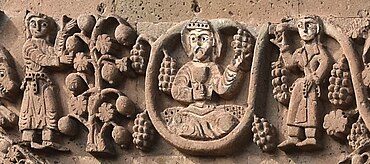Gagik I Artsruni
| Gagik I Artsruni Գագիկ Ա Արծրունի | |
|---|---|
| King of Vaspurakan | |
 Assumed depiction of Gagik in the vine-scroll relief on the eastern facade of the Church of the Holy Cross (915–921) | |
| Reign | 904–937/943 |
| Investiture | 908 |
| Predecessor | Ashot-Sargis Artsruni |
| Successor | Derenik-Ashot |
| Born | 879/880 |
| Died | 943 |
| Consort | Grigoradukht (daughter of Grigor Abuhamza Artsruni) Mlke (granddaughter of Ashot I)[1] |
| Issue | Derenik-Ashot Abusahl-Hamazasp Khedenik[2] |
| Armenian | Գագիկ Ա Արծրունի |
| House | Artsruni |
Gagik I Artsruni (Armenian: Գագիկ Ա Արծրունի; 879/880 – 943) was an Armenian noble of the Artsruni dynasty who ruled over Vaspurakan in southern Armenia, first as prince of northwestern Vaspurakan (Gagik III, 904–908) and after that until his death as King of Vaspurakan, also claiming the title of King of Armenia.
Background

Since the end of the 7th century, Armenia was under Arab dominion and headed by an ostikan (governor) representing the Umayyad, and later Abbasid caliphates,[3] and was the scene of numerous battles against the Byzantine Empire since the 9th century.[4] To strengthen the Arab authority, these ostikans were implanted into various regions of Armenian emirs; the historical province of Vaspurakan was no exception to this.[5] In opposition, the Armenian nobility created ishkhans (princes) to gradually extend their authority in the region.[6][7]
Biography
Youth and regency
Second son of Grigor-Derenik Artsruni, the Prince of Vaspurakan, and Sophia Bagratuni, the daughter of King Ashot I of Armenia, Gagik was born in 879 or 880.[citation needed] Upon the death of Grigor-Derenik in 887, Gagik Apumrvan Artsruni became regent of Vaspurakan (and later ishksan) and was given Grigor-Derenik's three children Gagik, Ashot-Sargis, and Gurgen.[8] In response to Gagik Apumrvan Artsruni's defection in a military operation ordered by Smbat I, Gagik I Artsruni killed Gagik Apumrvan Artsruni and Ashot-Sargis was given the regency.[9] In response to this, Smbat I promoted Gagik to the rank of general and Gurgen to marzpan (governor).[10]
Ishkhan
Gagik succeeded his elder brother Ashot-Sargis as ishkhan in 904[11] and allowed Gourgen to rule over the southeastern possessions of the Artsruni family; both worked well together until the death of Gurgen in 923.[12] After various rebel attacks,[13] Gagik developed a talent for creating military and political strategies and worked towards decreasing the number of Muslim enclaves of Vaspurakan.[14]
King
Gagik was an ally of the Sajid emir of Azerbaijan Yusuf ibn Abi'l-Saj, from whom he received recognition as king in 908, against the Bagratid Smbat I.[15] His state was recognized by the Byzantine Empire, who awarded him the title of "prince of princes" traditionally borne by the pre-eminent Armenian ruler, and his legitimacy received a further boost when the Armenian catholicos, John V the Historian, abandoned Muslim-ruled Dvin for Vaspurakan in 924. However, Gagik later reversed his position and allied himself with Smbat's son and successor, Ashot II. He is also notable as the founder of the Armenian Cathedral of the Holy Cross.[14]
References
- ^ Khach'atryan, Sekhpossian & Merguerian 2001, p. 110.
- ^ Adalian 2010, p. 110.
- ^ Martin-Hisard 1982, p. 223.
- ^ Martin-Hisard 1982, p. 231.
- ^ Martin-Hisard 1982, p. 232.
- ^ Martin-Hisard 1982, p. 233.
- ^ Martin-Hisard 1982, p. 234.
- ^ Toumanoff 1990, pp. 102–103.
- ^ Thierry 1982, p. 275.
- ^ Jones 2007, p. 23.
- ^ Thierry 1982, p. 276.
- ^ Grousset 1947, p. 422.
- ^ Grousset 1947, p. 423.
- ^ a b Jones, p. 115.
- ^ Grousset 1947, p. 433.
Bibliography
- Adalian, Rouben Paul (2010). Historical Dictionary of Armenia.
- Khach'atryan, Hayk; Sekhpossian, Nouné; Merguerian, Barbara J. (2001). Queens of the Armenians: 150 biographies based on history and legend.
- Martin-Hisard, Bernadette (1982). Arab Domination and Armenian Freedoms (seventh-ninth century). Toulouse: Privat. ISBN 978-2-7089-6874-5.
- Toumanoff, Cyrille (1990). The dynasties of Christian antiquity to the Caucasus of xixth century. Rome.
{{cite book}}: CS1 maint: location missing publisher (link) - Thierry, Jean-Michel (1982). Northern Kingdom and Southern Kingdom. Privat. ISBN 978-2-7089-6874-5.
- Jones, Lynn (2007). Between Islam and Byzantium: Aght'amar and the Visual Construction of Medieval Armenian Rulership. Ashgate Publishing. ISBN 978-0754638520.
- Grousset, René (1947). History of Armenia from its origins to 1071. Payot. ISBN 978-2-228-88912-4.
- Kazhdan, Alexander, ed. (1991). The Oxford Dictionary of Byzantium. Oxford and New York: Oxford University Press. pp. 161, 2154. ISBN 0-19-504652-8.
- Jones, Lynn. The Church of the Holy Cross and the Iconography of Kingship. Vol. 33. Gesta.
- Garsoïan, Nina G. (1997). "The independent kingdoms of medieval Armenia". In Hovhannisian, Richard G. (ed.). The Armenian People from Ancient to Modern Times. Volume 1, The Dynastic Periods: From Antiquity to the Fourteenth Century. New York: St. Martin's Press. pp. 143–185. ISBN 0-312-10169-4.
- Ter-Ghewondyan, Aram (1976). The Arab Emirates in Bagratid Armenia. Translated by Nina G. Garsoïan. Lisbon: Livraria Bertrand. OCLC 490638192.
Further reading
- Vacca, Alison (2017). Non-Muslim Provinces under Early Islam: Islamic Rule and Iranian Legitimacy in Armenia and Caucasian Albania. Cambridge University Press. ISBN 978-1107188518.


